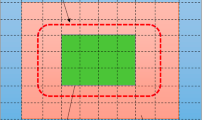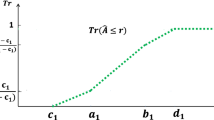Abstract
Nowadays, rough set theory has become an invaluable tool to represent the uncertainty in different optimization problems because of its aspect of considering agreement and knowledge of all the experts and hence addressing more realistic decisions. Motivated by the nature of rough sets, in this study we investigate an unbalanced multi-objective fixed-charge transportation problem in which all the decision variables as well as coefficients of the objective functions and constraints are represented by rough intervals. A new method has been proposed to solve an unbalanced fully rough multi-objective fixed-charge transportation problem in which, firstly, an unbalanced fully rough multi-objective fixed-charge transportation problem transformed into a balanced fully rough multi-objective fixed-charge transportation problem. Then three approaches, namely, fuzzy programming technique, goal programming technique and weighted-sum method are applied for obtaining the Pareto-optimal solution of the transformed balanced fully rough multi-objective fixed-charge transportation problem. In weighted-sum method, analytic hierarchy process has been used to determine the weights corresponding to objective functions. A comparison is drawn between the Pareto-optimal solutions which are derived from different approaches. Since the obtained solution is in a rough environment, it provides a wide range to help the decision maker to extract the best compromise solution. Finally, a case study is solved to show the contribution of the article in the field of decision-making and transportation.




Similar content being viewed by others
References
Adlakha V, Kowalski K, Lev B (2010) A branching method for the fixed charge transportation problem. Omega 38(5):393–397
Ahmad F, Adhami AY (2019) Neutrosophic programming approach to multiobjective nonlinear transportation problem with fuzzy parameters. Int J Manag Sci Eng Manag 14(3):218–229
Akbari M, Molla-Alizadeh-Zavardehi S, Niroomand S (2020) Meta-heuristic approaches for fixed-charge solid transportation problem in two-stage supply chain network. Oper Res Int J 20(1):447–471
Akilbasha A, Natarajan G, Pandian P (2017) Solving transportation problems with mixed constraints in rough environment. Int J Pure Appl Math 113(9):130–138
Aktar MS, De M, Mazumder SK, Maiti M (2021) Multi-objective green 4-dimensional transportation problems for breakable incompatible items with different fixed charge payment policies. Computers & Industrial Engineering 156:107184
Arabani M, Nashaei MA (2006) Application of rough set theory as a new approach to simplify dams location. Sci Iran 13(2)
Atanassov K (1986) Intuitionistic fuzzy sets. Fuzzy Sets Syst 20(1):87–96
Bagheri M, Ebrahimnejad A, Razavyan S, Lotfi FH, Malekmohammadi N(2020) Fuzzy arithmetic dea approach for fuzzy multi-objective transportation problem. Oper Res 1–31
Bera RK, Mondal SK (2020) Credit linked two-stage multi-objective transportation problem in rough and bi-rough environments. Soft Comput 24(23):18129–18154
Bera S, Giri PK, Jana DK, Basu K, Maiti M (2018) Multi-item 4d-tps under budget constraint using rough interval. Appl Soft Comput 71:364–385
Can T, Koçak H (2016) Tuncay can’s approximation method to obtain initial basic feasible solution to transport problem. Appl Comput Math 5(2):78–82
Charnes A, Cooper WW (1957) Management models and industrial applications of linear programming. Manag Sci 4(1):38–91
Ebrahimnejad A, Verdegay JL (2018) A new approach for solving fully intuitionistic fuzzy transportation problems. Fuzzy Optim Decis Mak 17(4):447–474
Garg H, Rizk-Allah RM (2021) A novel approach for solving rough multi-objective transportation problem: development and prospects. Comput Appl Math 40(4):1–24
Ghosh S, Roy SK, Ebrahimnejad A, Verdegay JL (2021) Multi-objective fully intuitionistic fuzzy fixed-charge solid transportation problem. Complex Intell Syst 1–15
Ghosh S, Roy SK (2021) Fuzzy-rough multi-objective product blending fixed-charge transportation problem with truck load constraints through transfer station. RAIRO: Recherche Opérationnelle 55:2923
Golden BL, Wasil EA, Harker PT (1989) The analytic hierarchy process. Applications and Studies, Berlin, Heidelberg, p 2
Hirsch WM, Dantzig GB (1968) The fixed charge problem. Naval Res Logist Q 15(3):413–424
Hitchcock FL (1941) The distribution of a product from several sources to numerous localities. J Math Phys 20(1–4):224–230
Hongwei Z, Xiaoke C, Shurong Z (2010) Multi-objective fixed-charged transportation optimization in supply chain management. In: 2010 International Conference on E-Business and E-Government, IEEE, pp 3247–3250
Jo J-B, Li Y, Gen M (2007) Nonlinear fixed charge transportation problem by spanning tree-based genetic algorithm. Comput Ind Eng 53(2):290–298
Kamini, Sharma MK (2020) Zero-point maximum allocation method for solving intuitionistic fuzzy transportation problem. Int J Appl Comput Math 6(4):1–11
Karagul K, Sahin Y (2020) A novel approximation method to obtain initial basic feasible solution of transportation problem. J King Saud Univ-Eng Sci 32(3):211–218
Kumar A, Kaur A (2012) Methods for solving unbalanced fuzzy transportation problems. Oper Res Int J 12(3):287–316
Kumar R, Edalatpanah S, Jha S, Singh R (2019) A pythagorean fuzzy approach to the transportation problem. Complex Intell Syst 5(2):255–263
Kundu P, Kar S, Maiti M (2014) Fixed charge transportation problem with type-2 fuzzy variables. Inf Sci 255:170–186
Liang J, Qian Y (2006) Axiomatic approach of knowledge granulation in information system. In: Australasian Joint Conference on Artificial Intelligence, Springer, New York, pp 1074–1078
Liu B (2009) Theory and practice of uncertain programming, Vol. 239, Springer, New York
Mahajan S, Gupta S (2019) On fully intuitionistic fuzzy multiobjective transportation problems using different membership functions. Ann Oper Res pp 1–31
Mahmoodirad A, Allahviranloo T, Niroomand S (2019) A new effective solution method for fully intuitionistic fuzzy transportation problem. Soft Comput 23(12):4521–4530
Maity G, Roy SK (2017) Solving fuzzy transportation problem using multi-choice goal programming. Discrete Math Algorithms Appl 9(06):1750076
Midya S, Roy SK (2020) Multi-objective fixed-charge transportation problem using rough programming. Int J Oper Res 37(3):377–395
Midya S, Roy SK, Vincent FY (2021) Intuitionistic fuzzy multi-stage multi-objective fixed-charge solid transportation problem in a green supply chain. Int J Mach Learn Cybernet 12(3):699–717
Midya S, Kumar Roy S, Wilhelm Weber G (2021) Fuzzy multiple objective fractional optimization in rough approximation and its aptness to the fixed-charge transportation problem. RAIRO–Oper Res 55(3)
Ojha A, Das B, Mondal SK, Maiti M (2013) A multi-item transportation problem with fuzzy tolerance. Appl Soft Comput 13(8):3703–3712
Osman MS, El-Sherbiny MM, Khalifa HA, Farag HH (2016) A fuzzy technique for solving rough interval multiobjective transportation problem. Int J Comput Appl 147(10)
Pawlak Z (1982) Rough sets. Int J Comput Inf Sci 11(5):341–356
Pengfei Z, Tianrui L, Guoqiang W, Chuan L, Hongmei C, Junbo Z, Dexian W, Zeng Y (2021) Multi-source information function based on rough set theory: a review. Inf Fusion 68:85–117
Rebolledo M (2006) Rough intervals-enhancing intervals for qualitative modeling of technical systems. Artif Intell 170(8–9):667–685
Roy SK, Ebrahimnejad A, Verdegay JL, Das S (2018) New approach for solving intuitionistic fuzzy multi-objective transportation problem. Sādhanā 43(1):3
Roy SK, Midya S, Yu VF (2018) Multi-objective fixed-charge transportation problem with random rough variables. Int J Uncertain Fuzziness Knowl-Based Syst 26(06):971–996
Roy SK, Midya S, Weber G-W (2019) Multi-objective multi-item fixed-charge solid transportation problem under twofold uncertainty. Neural Comput Appl 31(12):8593–8613
Ruidas S, Seikh MR, Nayak PK (2021) A production-repairing inventory model considering demand and the proportion of defective items as rough intervals. Oper Res 1–27
Seikh MR, Dutta S, Li D-F (2021) Solution of matrix games with rough interval pay-offs and its application in the telecom market share problem. Int J Intell Syst
Sheng Y, Yao K (2012) Fixed charge transportation problem and its uncertain programming model. Ind Eng Manag Syst 11(2):183–187
Singh SK, Yadav SP (2016) A new approach for solving intuitionistic fuzzy transportation problem of type-2. Ann Oper Res 243(1):349–363
Tao Z, Xu J (2012) A class of rough multiple objective programming and its application to solid transportation problem. Inf Sci 188:215–235
Upmanyu M, Saxena RR (2016) On solving a multiobjective fixed charge problem with imprecise fractional objectives. Appl Soft Comput 40:64–69
Velázquez-Rodríguez JL, Villuendas-Rey Y, Yáñez-Márquez C, López-Yáñez I, Camacho-Nieto O (2020) Granulation in rough set theory: a novel perspective. Int J Approx Reason 124:27–39
Xu J, Tao Z (2011) Rough multiple objective decision making. CRC Press, Boca Raton
Xu J, Tao Z (2019) Rough multiple objective decision making. Chapman and Hall/CRC, London
Yinzhen LI, Kenichi IDA, Mitsuo GEN (1997) Improved genetic algorithm for solving multiobjective solid transportation problem with fuzzy numbers. J Jpn Soci Fuzzy Theory Syst 9(2):239–250
Zadeh L (1963) Optimality and non-scalar-valued performance criteria. IEEE Trans Autom Control 8(1):59–60
Zadeh L (1965) Fuzzy sets. Inf Control 8(3):338–353
Zimmermann H-J (1978) Fuzzy programming and linear programming with several objective functions. Fuzzy Sets Syst 1(1):45–55
Acknowledgements
The first author is thankful to the Ministry of Human Resource Development, India, for providing financial support, to carry out this work. The authors would like to thank the anonymous reviewers and the associate editor for their insightful comments and suggestions.
Author information
Authors and Affiliations
Corresponding author
Ethics declarations
Conflict of interest
All the authors declare that they have no conflict of interest
Ethical approval
This article does not contain any studies with human participants or animals performed by any of the authors.
Additional information
Communicated by Graçaliz Pereira Dimuro.
Publisher's Note
Springer Nature remains neutral with regard to jurisdictional claims in published maps and institutional affiliations.
Rights and permissions
About this article
Cite this article
Shivani, Rani, D. & Ebrahimnejad, A. An approach to solve an unbalanced fully rough multi-objective fixed-charge transportation problem. Comp. Appl. Math. 41, 129 (2022). https://doi.org/10.1007/s40314-022-01830-5
Received:
Revised:
Accepted:
Published:
DOI: https://doi.org/10.1007/s40314-022-01830-5
Keywords
- Unbalanced fixed-charge transportation problem
- Multi-objective optimization
- Rough interval coefficient
- Fuzzy programming technique
- Goal programming technique
- Weighted-sum method
- Analytic hierarchy process
- Pareto-optimal solution.





